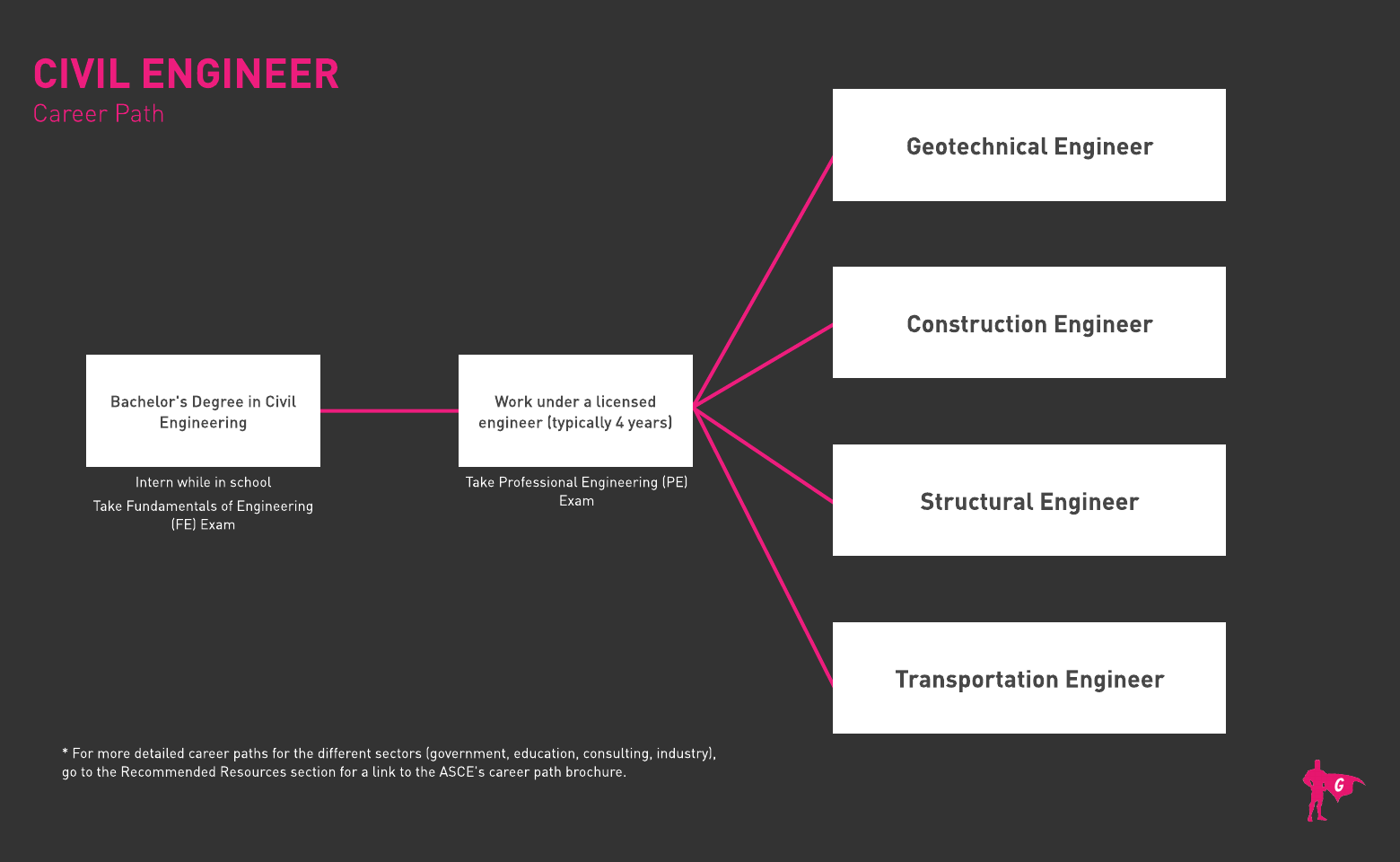Spotlights
Construction Engineer, Geotechnical Engineer, Structural Engineer, Transportation Engineer, City Engineer, Civil Engineer, County Engineer, Design Engineer, Engineer, Licensed Engineer, Project Engineer, Railroad Design Consultant
Civil engineers conceive, design, build, supervise, operate, construct, and maintain infrastructure projects and systems in the public and private sector, including roads, buildings, airports, tunnels, dams, bridges, and systems for water supply and sewage treatment.
“As a civil engineer I am in a global network of experts working with clients, communities and colleagues to develop and implement innovative solutions to the world’s most complex challenges. We deliver clean water and energy. Building iconic skyscrapers. Plan new cities. Restore damaged environments. Connect people and economies with roads, bridges, tunnels and transit systems. Design parks where children play. Help governments maintain stability and security” – Moises Young
“I first catch up on emails for the 3 projects I am managing. Then I check in with project task engineers to make sure the project teams are set for the day. I review the engineering assignments and sign off on them. I also run project meetings to update team on project budget and schedule. Lastly I coordinate with the clients regarding the project progression.” – Moises Young
- Tư duy phản biện
- Đọc hiểu
- Lắng nghe tích cực
- Complex problem solving
- Mathematics
- Design
- Building/construction
- Design firms
- General contractors
- Government entities
Civil engineers can work on a wide range of project such as: bridge projects, highway design, commercial/residential buildings, transportation design, environmental projects, or geotechnical designs.
Civil engineers typically work full time, and about 3 in 10 worked more than 40 hours per week in 2016. Engineers who direct projects may need to work extra hours to monitor progress on the projects, to ensure that designs meet requirements, and to guarantee that deadlines are met.
- Science & Math
- Taking things apart
- Learning about how things work
“Developing/improving smart materials, sustainable designs, energy efficient buildings, new computer software's for virtual/augmented reality design.” – Moises Young
- Civil Engineers usually need a bachelor’s in civil engineering or civil engineering technology from an ABET-accredited engineering program
- A master’s isn’t needed but can help qualify you for advanced positions and higher wages
- Per O*Net, 86% of all Civil Engineers have a bachelor’s, 10% a master’s, and 5% have a post-baccalaureate certificate
- Cooperative educational programs or internships are helpful for rounding out one’s experiences
- Entry-level workers don’t need a license, but many opt to complete a Professional Engineering (PE) licensure program so they can become licensed Professional Engineers able to “oversee the work of other engineers, sign off on projects, and provide services directly to the public”
- Each state has different licensing requirements. Candidates may need to first take a Fundamentals of Engineering (FE) exam, become an Engineer in Training or Engineer Intern, then later take their Principles and Practice of Engineering (PE) exam
- Additional certifications can bolster your credentials. These include:
- Academy of Coastal, Ocean, Port & Navigation Engineers
- Diplomate, Ocean Engineering
- Diplomate, Navigation Engineering
- Diplomate, Port Engineering
- Academy of Geo-Professionals - Diplomate, Geotechnical Engineering
- American Academy of Project Management - Certified Planning Engineer
- American Hospital Association - Certified Healthcare Constructor
- American Public Works Association - Certified Public Infrastructure Inspector
- American Society of Heating, Refrigerating and Air-Conditioning Engineers - Certified HVAC Designer
- Association of Energy Engineers -
- Certified Measurement and Verification Professional
- Distributed Generation Certified Professional
- Certified Building Commissioning Professional
- Certified Building Energy Simulation Analyst
- Certified Energy Procurement Professional
- Construction Specifications Institute - Certified Construction Contract Administrator
- Golf Course Builders Association of America - Certified Golf Course Builder
- Green Business Certification Inc. - LEED AP Neighborhood Development
- International Fluid Power Society - Fluid Power Connector and Conductor
- National Council of Building Design Certification - Certified Professional Building Designer
- National Ground Water Association - Certified Ground Water Professional
- Society of American Value Engineers -
- Certified Value Specialist
- Value Methodology Associate Certification
- Academy of Coastal, Ocean, Port & Navigation Engineers
- Stock up on courses in math, statistics, engineering mechanics, fluid dynamics, English, and writing
- Gain practical work experience through Civil Engineer internships
- Volunteer for school activities where you can practice teamwork and collaboration skills
- Decide what type of Civil Engineer you want to be. Options include Construction Engineers, Geotechnical Engineers, Structural Engineers, and Transportation Engineers
- Technology and software to become familiar with include:
- Adobe Fireworks
- Computer-aided design software
- Phần mềm môi trường phát triển
- Document management software
- Enterprise resource planning software
- File versioning software
- Geographic information system
- Map creation programs
- Microsoft ActiveX
- Oracle Business Intelligence Enterprise Edition
- Project management software
- Supervisory control and data acquisition
- XML
- Read articles and watch tutorials about Civil Engineering to learn from insiders
- Try to schedule an Civil Engineer informational interview to ask questions
- Get specialized with an in-demand certification
- Join professional organizations to learn, grow, and network (see our Recommended Resources > Websites for a list of options)

“Work on a solid resume, interview with as many companies as you can, be prepared for your interview, dress appropriately, have a firm handshake, do your research on the company.” - Moises Young
- Civil Engineer internships are a great way to get started. Look for an internship focused on the area you are most interested in, such as construction, geotechnical engineering, structural engineering, or transportation
- List any certifications you have on your resume (if you’re working on a professional license, list that, too)
- Sign up for alerts on job portals such as Indeed, Simply Hired, Glassdoor, Google for Jobs, and Zippia
- There are also several engineering-specific job boards, such as National Society of Professional Engineers, EngineeringJobs.net, IEEE Job Site, Society of Women Engineers, ASCE Career Connections, Society of Hispanic Professional Engineers, American Council of Engineering Companies, C&ENjobs, ASHRAE Jobs, and Tau Beta Pi The Engineering Honor Society
- Talk with your school career center for help with resumes, mock interviews, and job fair dates and locations
- Per BLS, the states with the highest employment of Civil Engineers are California, Texas, Florida, New York, and Illinois
- Let your LinkedIn network know you are looking for a job!
- Ask former professors, supervisors, and co-workers to vouch for you as personal references
- Review Civil Engineer resume templates to get fresh ideas
- Study Civil Engineer interview questions to prep for interviews
- Take time to learn how to dress for interview success
- After interviews, jot down notes so you can learn and improve
Trang web
- Accreditation Board for Engineering and Technology
- American Concrete Institute
- American Congress of Surveying and Mapping
- American Council of Engineering Companies
- American Public Works Association
- American Society for Engineering Education
- American Society of Civil Engineers
- American Water Works Association
- ASTM International
- Earthquake Engineering Research Institute
Sách vở
- Civil Engineering Basics: Water, Wastewater, and Stormwater Conveyance, by Daniel Mosher
- Main Formulas and 5 Full Civil Engineering PE Practice Breadth Exams with Detailed Solutions, by Ali Asadi P.E.
- The Engineering Book: From the Catapult to the Curiosity Rover, 250 Milestones in the History of Engineering, by Marshall Brain
- Architect
- Civil Engineer Technician
- Construction Manager
- Environmental Engineer
- Landscape Architect
- Mechanical Engineer
- Surveyor
- Urban and Regional Planner
“Stay focused and greatness will come. Think about who you are, what you want to do with your life, and how you can give back to the community.” – Moises Young
Nguồn cấp tin tức

Công việc nổi bật

Các khóa học và công cụ trực tuyến








